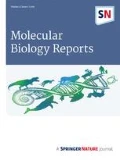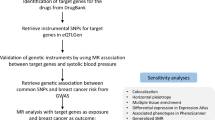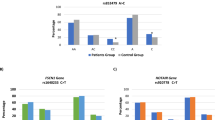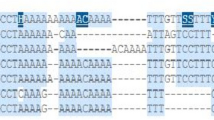Abstract
Adiponectin is a protein hormone secreted exclusively by adipocytes and it is responsible for insulin sensitization in the human body. Deregulation of adiponectin and its downstream signaling pathway genes have been found to be involved in the gastric cancer carcinogenesis; however, whether the variants on adiponectin (ADIPOQ) and adiponectin receptor 1 (ADIPOR1) affect the prognosis of gastric cancer patients are still unknown. Here we have recruited 455 gastric cancer patients, who have received the gastrectomy treatment to evaluate the prognostic effects of variants on ADIPOQ (rs266729 and rs822395) and AdipoR1 (rs12733285 and rs1342387) for the gastric cancer patients. No significant association between the four variants and the overall survival of the gastric cancer patients was found. However, for those patients without a previous history of alcohol drinking, the rs266729 GG/CG genotype carriers showed a significantly decreased gastric cancer mortality compared to homogeneity CC patients (HR 0.74, 95 % CI 0.56–0.97; p = 0.032) after adjustment for variants age, sex, smoking status, tumor stage, tumor location and post-surgery chemotherapy. No significant association between the variant rs266729 genotypes and overall survival for the gastric cancer patients with an alcohol drinking habit. These data suggested that the variant rs266729 was an independent prognostic factor for the never drinking gastric cancer patients who received surgical treatment.

Similar content being viewed by others
Abbreviations
- SNP:
-
Single nucleotide polymorphisms
- ADIPOQ:
-
Adiponectin gene
- ADIPOR1:
-
Adiponectin receptor 1 gene
- HR:
-
Hazard ratio
- 95 % CI:
-
95 % confidence interval
- AMPK:
-
AMP-activated protein kinase
- PPAR:
-
Peroxisome proliferator-activated receptor
- NSCLC:
-
Non-small cell lung cancer
- FGF:
-
Fibroblast growth factor
- PDGF-BB:
-
Platelet-derived growth factor BB
- HB EGF:
-
Heparin-binding epidermal growth factor-like growth factor
References
Jemal A, Bray F, Center MM, Ferlay J, Ward E et al (2011) Global cancer statistics. CA Cancer J Clin 61:69–90
Ding YB, Xia TS, Wu JD, Chen GY, Wang S et al (2012) Surgical outcomes for gastric cancer of a single institute in southeast China. Am J Surg 203:217–221
Diez JJ, Iglesias P (2010) The role of the novel adipocyte-derived protein adiponectin in human disease: an update. Mini Rev Med Chem 10:856–869
Diez JJ, Iglesias P (2003) The role of the novel adipocyte-derived hormone adiponectin in human disease. Eur J Endocrinol 148:293–300
An W, Bai Y, Deng SX, Gao J, Ben QW et al (2011) Adiponectin levels in patients with colorectal cancer and adenoma: a meta-analysis. Eur J Cancer Prev 21(2):126–133
Miyoshi Y, Funahashi T, Kihara S, Taguchi T, Tamaki Y et al (2003) Association of serum adiponectin levels with breast cancer risk. Clin Cancer Res 9:5699–5704
Chen DC, Chung YF, Yeh YT, Chaung HC, Kuo FC et al (2006) Serum adiponectin and leptin levels in Taiwanese breast cancer patients. Cancer Lett 237:109–114
Tworoger SS, Eliassen AH, Kelesidis T, Colditz GA, Willett WC et al (2007) Plasma adiponectin concentrations and risk of incident breast cancer. J Clin Endocrinol Metab 92:1510–1516
Dal Maso L, Augustin LS, Karalis A, Talamini R, Franceschi S et al (2004) Circulating adiponectin and endometrial cancer risk. J Clin Endocrinol Metab 89:1160–1163
Soliman PT, Wu D, Tortolero-Luna G, Schmeler KM, Slomovitz BM et al (2006) Association between adiponectin, insulin resistance, and endometrial cancer. Cancer 106:2376–2381
Ashizawa N, Yahata T, Quan J, Adachi S, Yoshihara K et al (2010) Serum leptin–adiponectin ratio and endometrial cancer risk in postmenopausal female subjects. Gynecol Oncol 119:65–69
Arisan ED, Arisan S, Atis G, Palavan-Unsal N, Ergenekon E (2009) Serum adipocytokine levels in prostate cancer patients. Urol Int 82:203–208
Li H, Stampfer MJ, Mucci L, Rifai N, Qiu W et al (2010) A 25-year prospective study of plasma adiponectin and leptin concentrations and prostate cancer risk and survival. Clin Chem 56:34–43
Ferroni P, Palmirotta R, Spila A, Martini F, Raparelli V et al (2007) Prognostic significance of adiponectin levels in non-metastatic colorectal cancer. Anticancer Res 27:483–489
Duggan C, Irwin ML, Xiao L, Henderson KD, Smith AW et al (2011) Associations of insulin resistance and adiponectin with mortality in women with breast cancer. J Clin Oncol 29:32–39
Yamauchi T, Kamon J, Ito Y, Tsuchida A, Yokomizo T et al (2003) Cloning of adiponectin receptors that mediate antidiabetic metabolic effects. Nature 423:762–769
Williams CJ, Mitsiades N, Sozopoulos E, Hsi A, Wolk A et al (2008) Adiponectin receptor expression is elevated in colorectal carcinomas but not in gastrointestinal stromal tumors. Endocr Relat Cancer 15:289–299
Tsukada T, Fushida S, Harada S, Terai S, Yagi Y et al (2011) Adiponectin receptor-1 expression is associated with good prognosis in gastric cancer. J Exp Clin Cancer Res 30:107
Petridou ET, Mitsiades N, Gialamas S, Angelopoulos M, Skalkidou A et al (2007) Circulating adiponectin levels and expression of adiponectin receptors in relation to lung cancer: two case-control studies. Oncology 73:261–269
Dalamaga M, Migdalis I, Fargnoli JL, Papadavid E, Bloom E et al (2009) Pancreatic cancer expresses adiponectin receptors and is associated with hypoleptinemia and hyperadiponectinemia: a case-control study. Cancer Causes Control 20:625–633
Michalakis K, Williams CJ, Mitsiades N, Blakeman J, Balafouta-Tselenis S et al (2007) Serum adiponectin concentrations and tissue expression of adiponectin receptors are reduced in patients with prostate cancer: a case control study. Cancer Epidemiol Biomark Prev 16:308–313
Yamauchi T, Nio Y, Maki T, Kobayashi M, Takazawa T et al (2007) Targeted disruption of AdipoR1 and AdipoR2 causes abrogation of adiponectin binding and metabolic actions. Nat Med 13:332–339
Ishikawa M, Kitayama J, Kazama S, Hiramatsu T, Hatano K et al (2005) Plasma adiponectin and gastric cancer. Clin Cancer Res 11:466–472
Seker M, Bilici A, Sonmez B, Ustaalioglu BB, Gumus M et al (2010) The association of serum adiponectin levels with histopathological variables in gastric cancer patients. Med Oncol 27:1319–1323
Ishikawa M, Kitayama J, Yamauchi T, Kadowaki T, Maki T et al (2007) Adiponectin inhibits the growth and peritoneal metastasis of gastric cancer through its specific membrane receptors AdipoR1 and AdipoR2. Cancer Sci 98:1120–1127
Otani K, Kitayama J, Kamei T, Soma D, Miyato H et al (2010) Adiponectin receptors are downregulated in human gastric cancer. J Gastroenterol 45:918–927
Cui E, Deng A, Wang X, Wang B, Mao W et al (2011) The role of adiponectin (ADIPOQ) gene polymorphisms in the susceptibility and prognosis of non-small cell lung cancer. Biochem Cell Biol 89:308–313
Wang Y, Lam KS, Xu JY, Lu G, Xu LY et al (2005) Adiponectin inhibits cell proliferation by interacting with several growth factors in an oligomerization-dependent manner. J Biol Chem 280:18341–18347
Kim AY, Lee YS, Kim KH, Lee JH, Lee HK et al (2010) Adiponectin represses colon cancer cell proliferation via AdipoR1- and -R2-mediated AMPK activation. Mol Endocrinol 24:1441–1452
Taliaferro-Smith L, Nagalingam A, Zhong D, Zhou W, Saxena NK et al (2009) LKB1 is required for adiponectin-mediated modulation of AMPK-S6K axis and inhibition of migration and invasion of breast cancer cells. Oncogene 28:2621–2633
Barresi V, Grosso M, Giuffre G, Tuccari G, Barresi G (2009) The expression of adiponectin receptors Adipo-R1 and Adipo-R2 is associated with an intestinal histotype and longer survival in gastric carcinoma. J Clin Pathol 62:705–709
Laumen H, Saningong AD, Heid IM, Hess J, Herder C et al (2009) Functional characterization of promoter variants of the adiponectin gene complemented by epidemiological data. Diabetes 58:984–991
Ong KL, Li M, Tso AW, Xu A, Cherny SS et al (2010) Association of genetic variants in the adiponectin gene with adiponectin level and hypertension in Hong Kong Chinese. Eur J Endocrinol 163:251–257
Persson J, Lindberg K, Gustafsson TP, Eriksson P, Paulsson-Berne G et al (2010) Low plasma adiponectin concentration is associated with myocardial infarction in young individuals. J Intern Med 268:194–205
Han LY, Wu QH, Jiao ML, Hao YH, Liang LB et al (2011) Associations between single-nucleotide polymorphisms (+45T > G, +276G > T, −11377C > G, −11391G > A) of adiponectin gene and type 2 diabetes mellitus: a systematic review and meta-analysis. Diabetologia 54:2303–2314
Yamada Y, Kato K, Oguri M, Yoshida T, Yokoi K et al (2008) Association of genetic variants with atherothrombotic cerebral infarction in Japanese individuals with metabolic syndrome. Int J Mol Med 21:801–808
Zhong C, Zhen D, Qi Q, Genshan M (2010) A lack of association between adiponectin polymorphisms and coronary artery disease in a Chinese population. Genet Mol Biol 33:428–433
Avery PJ, Patel SK, Ibrahim IM, Walker M, Keavney BD (2011) Common variation in the adiponectin gene has an effect on systolic blood pressure. J Hum Hypertens 25:719–724
Kaklamani VG, Wisinski KB, Sadim M, Gulden C, Do A et al (2008) Variants of the adiponectin (ADIPOQ) and adiponectin receptor 1 (ADIPOR1) genes and colorectal cancer risk. JAMA 300:1523–1531
Dhillon PK, Penney KL, Schumacher F, Rider JR, Sesso HD et al (2011) Common polymorphisms in the adiponectin and its receptor genes, adiponectin levels and the risk of prostate cancer. Cancer Epidemiol Biomark Prev 20:2618–2627
Sierksma A, Patel H, Ouchi N, Kihara S, Funahashi T et al (2004) Effect of moderate alcohol consumption on adiponectin, tumor necrosis factor-alpha, and insulin sensitivity. Diabetes Care 27:184–189
Englund Ogge L, Brohall G, Behre CJ, Schmidt C, Fagerberg B (2006) Alcohol consumption in relation to metabolic regulation, inflammation, and adiponectin in 64-year-old Caucasian women: a population-based study with a focus on impaired glucose regulation. Diabetes Care 29:908–913
Dal Maso L, La Vecchia C, Augustin LS, Mantzoros CS, Kendall CW et al (2007) Relationship between a wide range of alcohol consumptions, components of the insulin-like growth factor system and adiponectin. Eur J Clin Nutr 61:221–225
Kotani K, Sakane N, Saiga K, Sano Y, Kurozawa Y (2007) Lifestyle-related determinants and serum adiponectin concentrations in a general population of Japanese females. Arch Med Res 38:887–890
Imhof A, Plamper I, Maier S, Trischler G, Koenig W (2009) Effect of drinking on adiponectin in healthy men and women: a randomized intervention study of water, ethanol, red wine, and beer with or without alcohol. Diabetes Care 32:1101–1103
Joosten MM, Witkamp RF, Hendriks HF (2011) Alterations in total and high-molecular-weight adiponectin after 3 weeks of moderate alcohol consumption in premenopausal women. Metabolism 60:1058–1063
Kawamoto R, Tabara Y, Kohara K, Miki T, Ohtsuka N et al (2010) Alcohol drinking status is associated with serum high molecular weight adiponectin in community-dwelling Japanese men. J Atheroscler Thromb 17:953–962
Nishise Y, Saito T, Makino N, Okumoto K, Ito JI et al (2010) Relationship between alcohol consumption and serum adiponectin levels: the Takahata study–a cross-sectional study of a healthy Japanese population. J Clin Endocrinol Metab 95:3828–3835
Buechler C, Schaffler A, Johann M, Neumeier M, Kohl P et al (2009) Elevated adiponectin serum levels in patients with chronic alcohol abuse rapidly decline during alcohol withdrawal. J Gastroenterol Hepatol 24:558–563
Acknowledgments
This study was supported by grants from the Ministry of Science and Technology of China (2012BAK01B00 and 2014AA020524), the National Nature Science Foundation (81125020, 81328022, 81302507 and 81302809), the Key Research Program KSZD-EW-Z-021 and KSZD-EW-Z-019 of the Chinese Academy of Sciences, the Science and Technology Commission of Shanghai Municipality (12431900500), the Shanghai Institutes for Biological Sciences, Chinese Academy of Sciences(2012KIP308 and 2012KIP515) and the Food Safety Research Center and Key Laboratory of Food Safety Research of INS, SIBS, CAS.
Conflict of interest
None of the authors for the manuscript has declared any conflict of interest.
Author information
Authors and Affiliations
Corresponding authors
Additional information
Xuming Wu, Peizhan Chen, Yiyi Ou and Jibin Liu have contributed equally to this study.
Rights and permissions
About this article
Cite this article
Wu, X., Chen, P., Ou, Y. et al. Association of variants on ADIPOQ and AdipoR1 and the prognosis of gastric cancer patients after gastrectomy treatment. Mol Biol Rep 42, 355–361 (2015). https://doi.org/10.1007/s11033-014-3775-4
Received:
Accepted:
Published:
Issue Date:
DOI: https://doi.org/10.1007/s11033-014-3775-4




